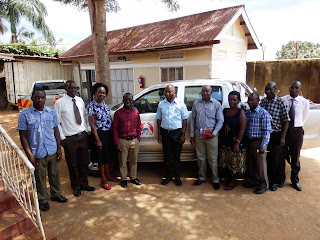Today (Wednesday 19 October 2016), is my last full day in Uganda as I start my long journey back to Guernsey tomorrow.
I have had a quite day at the Carpe Diem Guesthouse near Entebbe Airport. A time to relax and reflect on a busy and amazing few weeks in Uganda. It seems but a short while since I landed at Entebbe on 2 August 2016 and began this journey (perhaps I am getting old!).
These last 10 weeks of so have been amazing. I have seen and learnt so much - about myself, my faith life, development aid and the challenges of day-to-day life in one of the world's Least developed Countries. I have met some truly amazing people and forged friendships that I am sure will last for many years to come. Of course, I have missed family and friends and the routine of life and work in Guernsey.
Throughout my time here in Uganda, I am deeply grateful for the support I have received from family and friends not just at home but around the world. I know that without this support, encouragement and most of all the prayers of so many, I would not have been able to enjoy my time so much. Knowing that so many people were supporting me has kept me going when I have felt lonely and far from home (especially when the internet connections at Caritas Nebbi were down!).
I don't know how the experience of the last few weeks may have changed me. It would have been all too easy to make major and life-changing decisions here in Uganda but now is not the time to make such decisions. I know I need to return home, to resume "normal life", to get back to work, to catch up with family and friends and then to reflect and discern what I may be being called to do going forward.
Thank you to all who have read my blog. I have enjoyed writing it and will, over the coming weeks, spend time rereading all I have posted. I won't sign off just yet as the journey home is yet to come.
Please keep me in your prayers and thoughts that my journey will be a safe one and I will make all my connections and arrive safely back at Guernsey Airport around 11.00am on Friday 21 October 2016 and be reunited with my family.























